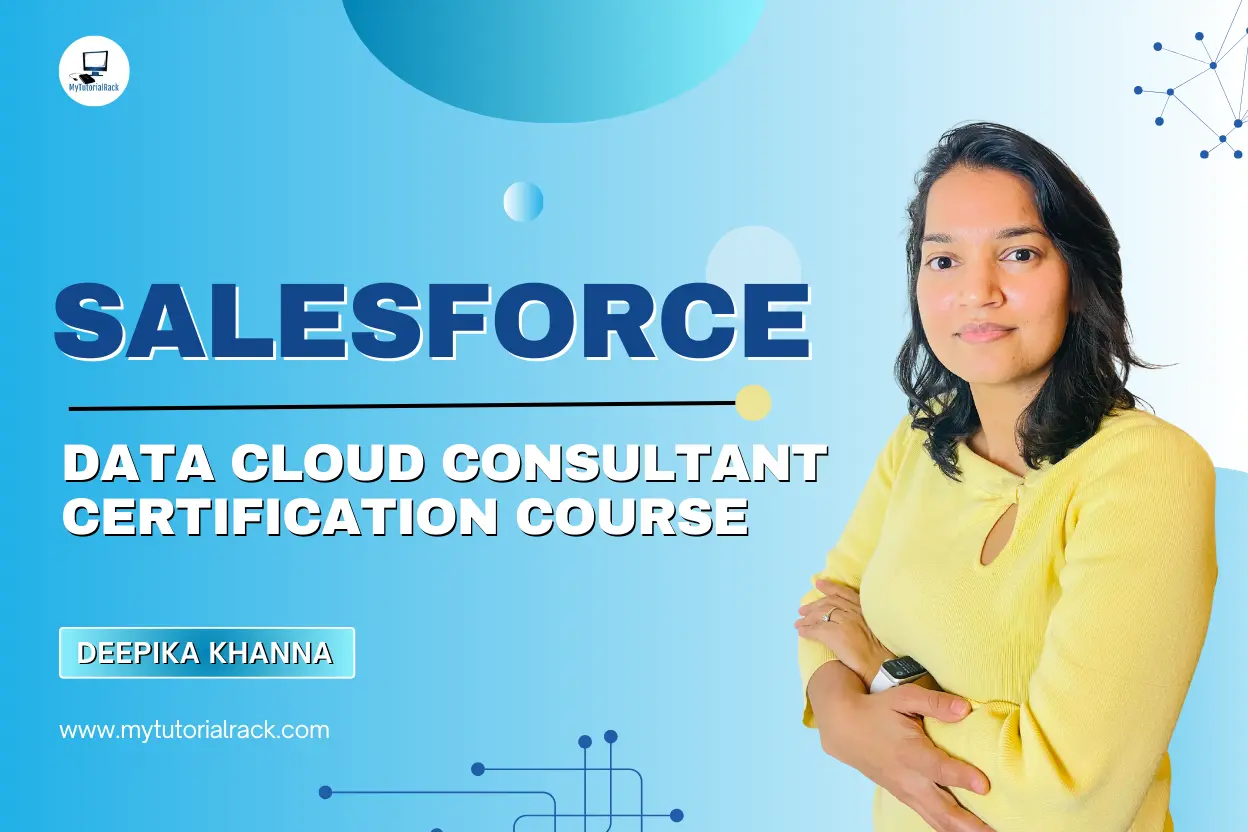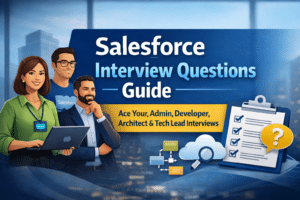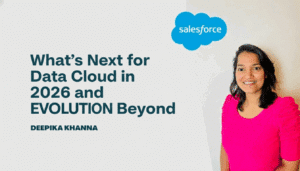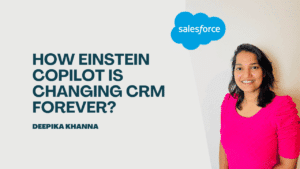Table of Contents
ToggleSalesforce Data Cloud Consultant Certification Course.
By the end of this guide, you won’t just understand the overview of the course; you will know all the tools and strategies required. You’ll know how to use them to design smart, scalable solutions that actually help businesses succeed.
Ever wondered why some people seem to glide through certifications while others struggle endlessly?
It’s not just intelligence.
It’s how they approach the journey—and how their mind frames the challenge.
Let’s talk about the Salesforce Data Cloud Consultant Certification Course. At first glance, it looks like a rigid, fact-heavy exam. 60 multiple-choice questions. 105 minutes. Passing score: 62%. Cost: $200. Retake fee: $100.
Dry, right?
But here’s the catch—most people miss the deeper story behind these numbers.
> Because the exam isn’t just about memorizing facts.
> It’s about thinking like a consultant.
About understanding why customer requirements matter, how to design solutions that last, and how to shape systems that actually help businesses succeed. That’s where the psychology comes in. If you see it as just a test, it becomes a chore. If you see it as a map of your future problem-solving identity, it becomes… engaging.
| Ready to ace your Salesforce Data Cloud Consultant Certification Course? Start learning now at MyTutorialRack.com — your shortcut to success! |
What do Salesforce Data Cloud Consultants do?
And yes, there are six core areas of knowledge in the Salesforce Data Cloud Consultant Course you’ll need to master. Each one is a lens through which you can see the bigger picture: not just “how” things work, but why they work the way they do. That perspective is what separates a certificate-holder from someone who actually transforms data into business success.
Here is a Data Cloud Consultant Topic Weighting Chart:
What does This Course cover?
And yes, there are six core areas of knowledge in the Salesforce Data Cloud Consultant Course you’ll need to master. Each one is a lens through which you can see the bigger picture: not just “how” things work, but why they work the way they do. That perspective is what separates a certificate-holder from someone who actually transforms data into business success.
Here is a Data Cloud Consultant Topic Weighting Chart:
| Objective | Weighting |
| Data Ingestion and Modeling | 20% |
| Act on Data | 18% |
| Data Cloud Overview | 18% |
| Segmentation and Insights | 18% |
| Identity Resolution | 14% |
| Data Cloud Setup and Administration | 12% |
Here’s the thing: certifications like this aren’t just milestones.
They’re signals.
Signals that you can think like a consultant, act like a strategist, and see the world through a problem-solving lens.
Every study session, every practice question—it’s training your mind to act with foresight, not just react.
Preparation for Salesforce Data Cloud Consultant
So, when you sit down to prepare, don’t force yourself through rote memorization.
Lean into the story. See yourself designing solutions, guiding clients, and solving problems in ways that feel… almost fun. Because the people who pass our latest Salesforce Data Cloud Consultant—who truly excel—don’t see the pain of studying as heavier than the reward. They see it as part of the story worth telling.
Stop Rushing the Certification. Here’s Why.
Most people jump straight into Salesforce data cloud consultant courses like they’re checking boxes. Pass the exam. Add it to the résumé. Done.
But here’s the thing: a certificate without depth is just paper.
If you want this Salesforce certification to actually mean something—to your career, your identity, and your confidence—you need to start where the real foundation is built.
And that’s the Salesforce Certified Platform Administrator.
The Mistake Everyone Makes
Too many people treat all Salesforce certifications like a sprint. They think, “If I just memorize the right answers, I’ll be fine.”
But you won’t.
Because what really sets professionals apart isn’t just passing the exam—it’s understanding how Salesforce works at a systems level. Knowing how each feature connects to the bigger picture. Being the person your team looks to when things break… or when they want to take things to the next level.
That’s what the Platform Administrator certification forces you to do:
- Explore every corner of the platform.
- Understand the user experience deeply.
- Get your hands dirty with Sales, Service, and Collaboration Clouds.
It’s less about passing and more about thinking like an architect (in this case, Salesforce Data Cloud Consultant).
When you walk into an interview—or even your own office—confidence isn’t about a badge on your LinkedIn profile. It’s about knowing you can solve problems no one else can.
That kind of quiet confidence? It changes the way people perceive you. You stop chasing opportunities… and opportunities start chasing you.
I once knew a guy—let’s call him Sameer—who skipped straight to an advanced Salesforce certification because “it looked good on paper.”
He passed.
But when his manager asked him to troubleshoot a complex automation issue, he froze. That one moment shattered the illusion of his “expertise.”
He ended up circling back, humbly getting his Platform Administrator cert, and rebuilding his foundation. And you know what? Six months later, that same manager gave him a promotion.
Not because of the certificate itself—but because of the competence behind it.
Here’s something you don’t hear often: Salesforce takes its exams seriously.
The security, the confidentiality—it’s all there to protect the value of your certification. So, when you pass, you’re joining a network of professionals who’ve actually earned it.
And yes, you’ll need to accept the certification program agreement. It’s not just legal fluff; it’s a reminder that this isn’t a game. This is about building a career built on trust and skill.
Don’t rush.
Get the Platform Administrator certification first. Build the muscle memory. Understand the system.
Because the real flex isn’t just having the badge. It’s being the person everyone turns to when they need answers—and knowing you can deliver.
| Take the next step in your Salesforce journey — visit MyTutorialRack.com now. |

Credit: media.licdn
Salesforce Data Cloud Consultant Certification Course Content
If you’re aiming for the Data Cloud Consultant certification, there are a few core areas you need to own.
Key Takeaways
| Data Cloud Overview | It will give you a clear picture of how Salesforce Data Cloud works and its benefits. |
|---|---|
| Data Cloud Setup and Administration | You will learn how to configure, manage, and optimize Data Cloud environments to keep everything running smoothly and securely for your clients. |
| Data Ingestion and Modeling | In this section, you will understand how to bring in data from multiple sources and model it effectively. So it’s ready to drive powerful insights and actions. |
| Identity Resolution | Here, you can master the process of connecting data points to create unified customer profiles. |
| Segmentation and Insights | This segment teaches you audiences and uncovers actionable insights that guide smarter marketing strategies, better decisions, and personalized customer experiences. |
| Act on Data | Finally, you will learn how to activate data to drive real results. |
01: Data Cloud: (It’s Not Just Data… It’s Power)
Here’s the thing about “data.”
Most people think of it as numbers in a spreadsheet. Rows. Columns. Boring stuff, the analytics guy in the corner cares about.
But the reality?
Data is identity.
Your customers are telling you stories—every click, every purchase, every support ticket. The question is, are you actually listening?
That’s where Salesforce Data Cloud steps in. It’s not just a tool; it’s a lens. A way to see your customers not as scattered pieces of information but as whole, living profiles.
And once you start seeing clearly… You start winning.
The Core of Data Cloud (and Why It Matters)
Let’s strip away the jargon for a second.
- Data Streams → Your real-time pipelines. They pull in customer activity as it happens.
- Unified Profiles → The 360-degree view of every customer, all in one place.
- Segments → Your way of grouping customers by behaviors, needs, or patterns.
It sounds simple, right? But here’s the psychological edge: humans crave personalization. We don’t want to feel like “just another customer.” And businesses that get this—businesses that use Data Cloud to connect the dots—are the ones that build loyalty so strong, competitors can’t touch it.
As a Salesforce Data Cloud Consultant. Think about it: when a brand knows what you need before you even ask, you stick around. That’s the business value of Data Cloud—turning scattered, siloed data into meaningful action that fuels growth.
Real-World Use Cases (a.k.a. Where the Magic Happens)
Data Cloud isn’t just for big corporations drowning in data. Its use cases are surprisingly human:
- Personalized Marketing: Creating campaigns that feel like they were written for one person—because, technically, they were.
- Real-Time Engagement: Sending a push notification at the exact moment a customer hesitates at checkout.
- Predictive Analytics: Spotting patterns and predicting churn before it happens, so you can save relationships instead of losing them.
In my 15 years of Salesforce experience, a retail brand I once worked with used to blast generic promotions. Open rates? Sad. Engagement? Worse. After integrating Data Cloud, they segmented customers by real-time behavior and started sending hyper-personalized offers. Sales didn’t just improve—they skyrocketed.
Why? Because relevance always wins.
How It Actually Works (Without the Tech Headache)
At its core, Data Cloud is like the nervous system of your business.
It pulls information from everywhere—your CRM, e-commerce platform, third-party apps—and feeds it into one unified system.
From there, it creates Unified Customer Profiles, which then fuel Segmentation and Insights. Suddenly, you’re not guessing what your customers want. You know.
But here’s the catch: this ecosystem only works if you build it on solid ground. That means robust data governance and seamless integration. Without them, you’re just piling chaos on top of chaos.
The Ethics Piece (Because Trust is Currency)
Here’s where a lot of businesses get it wrong. They see data as a goldmine… but forget that trust is the currency that lets you mine it.
Data ethics isn’t optional in Salesforce.
Transparency, consent, privacy, accountability—these aren’t just buzzwords; they’re the foundation of sustainable growth.
And if a Salesforce Data Cloud Consultant thinks your customers don’t care, think again. In a world where people are more privacy-aware than ever, respecting their data isn’t just the right thing to do—it’s the smart thing to do.
Follow GDPR, CCPA, whatever laws apply to you. But more than that, respect the relationship. Because once you lose trust, you lose everything.
The Shift You Need to Make
Stop treating data like “just data.”
Start seeing it as an extension of your customer relationships—dynamic, living, and deeply personal.
Because the businesses that master this mindset don’t just analyze data.
They create experiences. They build loyalty. They grow. And you?
You stop being just another consultant, marketer, or admin. You become the person who helps companies see.

Credit: logicrain.com
02: Data Cloud Setup & Administration
Most people think “setup” is the boring part. Click some buttons. Check some boxes. Done.
But here’s the truth… how you set up and administer Salesforce Data Cloud defines everything that comes next.
The speed of your automations.
The quality of your insights.
Even how secure your organization feels secure about its data.
This isn’t about toggles and settings. It’s about control. Confidence. And building a system that scales without chaos.
Permissions & Org-Wide Settings: Your First Line of Defense
Imagine giving the wrong person full access to sensitive customer profiles. One mistake. One misstep. Suddenly, you’re not just fixing a tech issue—you’re dealing with a compliance nightmare.
That’s why permissions and permission sets aren’t just a technical requirement; they’re your insurance policy. They define who sees what, who edits what, and who stays locked out.
And org-wide settings? They dictate your default sharing rules. Think of them as the invisible fences that keep your data flow clean and secure.
The psychology here is simple: when people trust the system, they use the system. As a Data Cloud consultant or admin, mastering permissions builds that trust—and prevents the kind of headaches that keep teams up at night.
Data Streams & Data Bundles: The Lifeblood of the Cloud
Data is your oxygen. But here’s the thing—oxygen only matters if it’s clean and steady.
That’s where data streams and data bundles come in.
- Data Streams are your pipelines—bringing in information from your CRM, e-commerce platforms, and even third-party tools, in real time or batch.
- Data Bundles are your organizers—prepackaged sets of related data elements that make ingestion faster and cleaner.
Get this right, and you create a
Data Spaces: Organized Chaos (The Smart Way)
Here’s a scenario: your company operates in multiple regions. Or across different product lines.
Without segmentation, you’re either breaking regulations or living in spreadsheet purgatory.
Data Spaces fix that. They let you isolate and manage data based on region, business unit, or any other requirement—without losing the ability to do cross-space analysis when needed.
Think of it like creating rooms in a house. Everyone has their space, but the walls aren’t permanent. You can still move between them when you need to.
For consultants, configuring data spaces isn’t just about compliance—it’s about clarity. Clean boundaries create cleaner decisions.
Reports, Dashboards, Flows, and Data Kits: Your Command Center
Managing Data Cloud efficiently isn’t about doing more. It’s about doing smarter.
- Reports and Dashboards keep your finger on the pulse—turning raw data into insights that leadership actually understands.
- Flows automate processes so your team stops babysitting repetitive tasks.
- Packaging and Data Kits? They’re your shortcuts—bundled configurations and pre-built components that speed up deployments and keep systems consistent.
When you leverage these tools, you’re not just an admin. You’re the architect of a system that runs like clockwork—and frees up time for the strategic moves that actually grow the business.
Exploring and Diagnosing with Data Explorer, Profile Explorer, and APIs
Even the best systems need tuning along with best best-trained Salesforce Data Cloud Consultant. That’s where the Data Explorer and Profile Explorer become your best friends.
These tools let you dig deep:
- Spot inconsistencies.
- Validate data accuracy.
- Troubleshoot issues before they become “all-hands-on-deck” emergencies.
And when you need more? APIs take you deeper—allowing custom integrations and advanced manipulations that push the limits of what the platform can do.
Here’s the hidden win: mastering these tools doesn’t just make you better at your job. It makes you the person everyone trusts when they’re lost in the noise. The problem solver. The strategist. The go-to.
The Mindset Shift
Setting up and administering Salesforce Data Cloud isn’t just about systems. It’s about identity.
The companies that win are the ones that see setup and administration not as “maintenance,” but as strategy.
Every permission you set, every data stream you configure, every dashboard you build—it’s a step toward creating an environment where data isn’t chaos, it’s clarity.Because when you manage the system well, you don’t just support the business.
You drive it.

Credit: cdnblog.webkul.com
03: Data Ingestion and Modeling
Let’s be honest…
Most people think of data ingestion and modeling as the “back-end, techy stuff” that only engineers care about.
But here’s the truth: if you don’t get this part right, the rest of your Salesforce Data Cloud Certification journey collapses.
This isn’t just about moving data from Point A to Point B.
It’s about shaping the foundation of every insight, every customer profile, every decision your business will make.
That’s why this part of the Salesforce Data Cloud Certification Course matters more than you think.
Transformation Capabilities: Cleaning the Chaos
Think of raw data like an unorganized closet. Sure, everything you own is in there… but good luck finding what you need when you need it.
Data Cloud’s transformation capabilities are the organizer. They cleanse, enrich, and standardize your data so it’s not just usable—it’s powerful.
- Duplicate records? Merged.
- Formatting errors? Corrected.
- Inconsistent naming? Standardized.
Here’s the psychological edge: when data is clean, teams trust it. And when they trust it, they use it to make bold, confident decisions.
Luckily, if you are able to find best best-selling Salesforce Data Cloud Consultant Certification course from a reliable brand (e.g., MyTutorialRack), then mastering these transformations means you’re not just fixing errors—you’re creating clarity. And clarity drives results.
Data Ingestion: Getting the Flow Right
Here’s the misconception: ingestion is just about “importing data.”
Wrong.
Data ingestion is about creating a seamless flow from multiple sources—CRMs, marketing platforms, external databases—into one unified system.
Each source has its quirks, its own formats, its own protocols.
And here’s where strategy comes in: if you align ingestion with the business’s actual goals, you’re not just moving data—you’re building a system that delivers real-time insights and a complete customer view.
This is what separates someone who “uses” Data Cloud from someone who truly masters it.
Data Mapping and Modeling: Building the 360° View
Imagine trying to assemble a 1,000-piece puzzle… with no picture on the box. That’s what messy, unmapped data feels like.
Defining, mapping, and modeling data is the process that brings that puzzle together. It’s how you link customer data from every source into one unified profile.
Best practices?
- Create consistent models.
- Resolve conflicts early.
- Design for identity resolution, not just ingestion.
Because here’s the deeper insight: when you get modeling right, you don’t just build a database—you build relationships. You give your business a 360-degree view of every customer, enabling personalization at a level that feels almost magical.
That’s the real power behind this step in the Salesforce Data Cloud Consultant Course.
Validation: Trust, but Verify
You can’t just assume your data is accurate.
That’s why Salesforce Data Cloud gives you tools like Data Explorer to inspect, validate, and troubleshoot at every stage of ingestion and modeling.
Being a Salesforce Data Cloud Consultant, it’s like running a quality check on every delivery that enters your warehouse—because if one bad record sneaks in, it can mess up everything down the line.
For you, as a consultant, this skill builds more than clean datasets. It builds trust. And in the world of data, trust is currency.
Here’s the part no one talks about:
Learning data ingestion and modeling in your Salesforce Data Cloud Certification Course isn’t just about passing the exam.
It’s about rewiring how you think.
You stop seeing data as a technical chore and start seeing it as the backbone of transformation. You realize that when the foundation is clean, accurate, and reliable, the entire business moves faster, smarter, and more confidently.
Because in the end, the companies that treat data as an afterthought stay stuck.The ones that master it?
They lead.

Credit: ceptes.com
04: Identity Resolution
Here’s the thing about data: it’s messy.
Different sources. Different spellings. Different formats.
And yet… your customer expects you to “know them.” Every click, every email, every interaction — they assume you’re looking at a single, crystal-clear version of them.
That’s where Salesforce Data Cloud Certification concepts around identity resolution flip the script. This isn’t just a feature; it’s a mindset shift.
Matching — The Art of Connecting the Dots
Think of matching as being a detective. You’re looking at five different “profiles” — one with an email, another with a phone number, another with a misspelled name — and realizing they’re all the same person.
In the Salesforce Data Cloud Consultant Course, you’ll dive into these “matching rule sets.” They’re like your investigation protocols — criteria like email, phone, or even fuzzy name logic — that tell the system how to decide when two records belong together.
Why does this matter?
Because a broken identity map breaks everything else — marketing campaigns, personalization, even customer support scripts. Nail this, and suddenly your brand feels personal, intuitive, human.
Data Reconciliation — Cleaning Up the Chaos
Here’s the reality: data fights with itself.
One system says “John Smith.” Another says, “Jon Smythe.” A third has an old address or phone number.
Data reconciliation is the peace treaty. In the Salesforce Data Cloud Certification Course, you’ll learn how to apply reconciliation rules to resolve these conflicts — choosing a “source of truth,” merging conflicting records, and ensuring no critical info slips through the cracks.
Why does this matter psychologically? Because decision-makers rely on data they trust. Clean data reduces hesitation, eliminates analysis paralysis, and makes every strategy sharper.
The Result — A Unified Customer View
When you combine matching and reconciliation, you don’t just get cleaner spreadsheets.
You get clarity.
A single customer profile that supports smarter targeting, more accurate segmentation, and engagement strategies that actually feel personal. This is where the Salesforce Data Cloud Consultant Certification stops being a badge on your LinkedIn and starts becoming a practical advantage in your career.
Imagine being the person in the room who can confidently say:
“Yes, we know exactly who this customer is, what they’ve done, and what they need next.”
That’s power. That’s what this skill set gives you.

Credit: email.uplers.com
05: Segmentation and Insights — The Secret Lever in Salesforce Data Cloud
Here’s the thing most people don’t realize:
Data isn’t the power. Clarity is.
You can have the most advanced tools, dashboards, and endless rows of customer data… and still have no idea what to do with it. That’s where segmentation in the Salesforce Data Cloud Consultant Course changes the game. It’s not about hoarding information — it’s about seeing the patterns that tell you exactly who your customers are, what they want, and how to connect with them in a way that actually matters.
Think about it.
When a customer sees an ad that feels like it was written just for them, they don’t think, “Oh, that’s a great segmentation strategy.” They think, “Wow, they get me.” And that’s the real power of Salesforce Data Cloud Certification — turning raw data into meaningful relationships.
Why Segmentation Isn’t Just a “Feature” — It’s an Identity Shift
Segmentation in Salesforce Data Cloud isn’t about organizing spreadsheets. It’s about grouping people based on shared characteristics — behavior, demographics, preferences — and using those insights to craft experiences that stick.
Use cases? Everywhere.
From hyper-targeted email campaigns to laser-focused retention strategies, segmentation turns guesswork into precision. Consultants who master this skill help businesses stop shouting into the void and start whispering to the right people… at the right time.
Analyzing Segment Membership — Reading Between the Lines
Here’s where it gets interesting.
When you analyze segment membership, you’re not just counting numbers. You’re decoding behaviors, seeing patterns, and asking, “Why is this customer here? What’s driving them?”
Picture this: a business runs a campaign, and the conversion rate spikes. Without segment analysis, they celebrate blindly. With it, they know which group responded, why they responded, and how to replicate that success.
That’s how Salesforce Data Cloud Consultants create marketing strategies that don’t just work — they scale.
Refining Segments — Because Static Data Is Dead Data
Here’s the hard truth: your segments aren’t permanent.
Customers evolve. Markets shift. Behavior changes. If you’re not refining your segments, you’re falling behind.
That’s why the Salesforce Data Cloud Certification Course teaches you how to configure new segments, tweak existing filters, and monitor performance like a pro. Dynamic segment management isn’t busywork — it’s the difference between campaigns that feel stale and ones that hit like they were crafted today.
Precision equals impact. And impact equals revenue.
Calculated vs. Streaming Insights — Knowing Which Data to Trust
Here’s a mistake beginners make: treating all insights as the same.
They’re not.
Calculated insights are your long-term players — metrics like average spend or lifetime value, built from historical data. Streaming insights, on the other hand, are your sprinters — real-time reactions to customer behavior, like browsing activity or abandoned carts.
As a consultant, your edge comes from knowing which insight to lean on.
Need to spot long-term trends? Go calculated.
Need to trigger instant engagement? Go streaming.
That’s the subtle mastery the Salesforce Data Cloud Consultant Certification prepares you for — helping businesses act, not just analyze.
06: Act on Data
Here’s the uncomfortable truth:
Most businesses sit on gold and don’t even know it.
They’ve got data. Reports. Charts. But they never act on it. They let insights collect digital dust while opportunities slip through their fingers.
That’s why the Salesforce Data Cloud Certification Course drills this in — data means nothing until you make it move. This is where activations, attributes, timing, and troubleshooting come together. And if you want to be a standout Salesforce Data Cloud Consultant, mastering this part? It’s non-negotiable.
Activations Turning Data Into Decisions
Think of activations as the bridge between “knowing” and “doing.”
Customer browses a product twice?
Boom — send a personalized offer.
Is a loyalty member a purchase threshold?
Trigger a reward.
That’s what activations in Salesforce Data Cloud do — they take those real-time insights and feed them into the business processes that drive action.
Here’s the mindset shift:
Data isn’t just numbers. It’s behavior. Intent. Opportunity.
Consultants who understand how to define and configure activations don’t just optimize campaigns — they help businesses have conversations with their customers at the perfect moment.
Attributes and Related Attributes — (for a best Salesforce Data Cloud Consultant)
Attributes for a Salesforce Data Cloud Consultant are the basic descriptors. Age. Location. Purchase history.
But related attributes? That’s where the depth lives.
Picture this: A customer buys running shoes (attribute) — and you also know they’re a loyalty program member with three unredeemed rewards (related attribute). Suddenly, your marketing doesn’t just say, “Here’s another pair you might like.” It says, “Use your points on the perfect match for your new shoes.”
That’s the kind of personalization that builds loyalty — and consultants with the Salesforce Data Cloud Certification know how to unlock it.
Timing Dependencies — Because Real-Time Isn’t Optional
Here’s a question: what’s the point of a perfect activation… if it happens too late?
That’s where timing dependencies in the Salesforce Data Cloud lifecycle matter. Data ingestion. Processing. Activation. Every sequence has to fire at the right moment, or the whole system falls out of sync.
Get this right, and you create real-time experiences that feel almost intuitive. Get it wrong, and you’re the brand sending a cart abandonment email two days after the customer has already bought somewhere else.
Mastering these dependencies? That’s how you go from reactive to proactive — and from average consultant to trusted advisor.
Troubleshooting Activations — Staying Calm in the Chaos
Here’s the reality: activations don’t always behave.
Rejected data. Errors. Missing related attributes. It happens.
But here’s the differentiator — a great Salesforce Data Cloud Consultant knows how to troubleshoot fast. They spot mismatched attributes. They catch incorrect filters. They find the tiny discrepancy causing the big problem.
Because smooth activations aren’t just about convenience — they’re about keeping customer engagement seamless and businesses confident in their data flow.
Data Actions — Automating Precision
Finally, we’ve got data actions — the quiet powerhouses of Salesforce Data Cloud Certification.
These are the triggers that turn insights into automated processes. Updating records. Sending alerts. Nudging the right people at the right time.
Imagine a customer abandoning their cart, and within seconds, a perfectly timed email — with an incentive — lands in their inbox. That’s not magic. That’s a well-configured data action doing exactly what it’s supposed to.
Consultants who understand these use cases don’t just help businesses operate efficiently — they help them create customer experiences that feel effortless.

Credit: cdn.shopaccino.com
Why Choose MyTutorialRack?
Most learners hit the same wall when preparing for the Salesforce Data Cloud Consultant Certification:
- Outdated study material that doesn’t match the current exam format
- No clear strategy for mastering the six core areas
- Lack of hands-on, real-world examples to build confidence
- Guesswork when it comes to AI-driven tools and automation techniques
That’s where MyTutorialRack changes the game.
Our Salesforce Data Cloud Consultant Certification Course gives you:
- Up-to-date, AI-powered study resources that align with the latest exam changes
- A step-by-step strategy that removes confusion and keeps your prep on track
- Real-world projects so you can apply concepts, not just memorize them
- Insider tips to think like a consultant, not just pass like a student
If you’re tired of feeling lost in the noise of random blogs, videos, and outdated PDFs, it’s time to switch to a guided path that actually works.
| We advise completing our Salesforce Data Cloud Consultant Certification Course in order to adequately prepare for the certification exam. |







